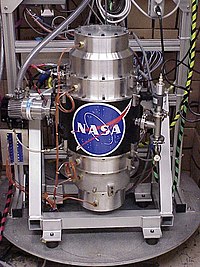
Photo from wikipedia
In recent years, concerns about severe environmental pollution and fossil fuel consumption has grabbed attention in the transportation industry, particularly in marine vessels. Another key challenge in ships is the… Click to show full abstract
In recent years, concerns about severe environmental pollution and fossil fuel consumption has grabbed attention in the transportation industry, particularly in marine vessels. Another key challenge in ships is the fluctuations caused by high dynamic loads. In order to have a higher reliability in shipboard power systems, presently more generators are kept online operating much below their efficient point. Hence, to improve the fuel efficiency of shipboard power systems, the minimum generator operation with N-1 safety can be considered as a simple solution, a tradeoff between fuel economy and reliability. It is based on the fact that the fewer the number of generators that are brought online, the more load is on each generator such that allowing the generators to run on better fuel efficiency region. In all-electric ships, the propulsion and service loads are integrated to a common network in order to attain improved fuel consumption with lesser emissions in contrast to traditional approaches where propulsion and service loads are fed by separate generators. In order to make the shipboard power system more reliable, integration of energy storage system (ESS) is found out to be an effective solution. Energy storage devices, which are currently being used in several applications consist of batteries, ultra-capacitor, flywheel, and fuel cell. Among the batteries, lithium-ion is one of the most used type battery in fully electric zero-emission ferries with the shorter route (around 5 to 10 km). Hybrid energy storage systems (HESSs) are one of the solutions, which can be implemented in high power/energy density applications. In this case, two or more energy storage devices can be hybridized to achieve the benefits from both of them, although it is still a challenge to apply presently such application by a single energy storage device. The aim of this paper is to review several types of energy storage devices that have been extensively used to improve the reliability, fuel consumption, dynamic behavior, and other shortcomings for shipboard power systems. Besides, a summary is conducted to address most of the applied technologies mentioned in the literature with the aim of highlighting the challenges of integrating the ESS in the shipboard microgrids.
Journal Title: Energies
Year Published: 2018
Link to full text (if available)
Share on Social Media: Sign Up to like & get
recommendations!